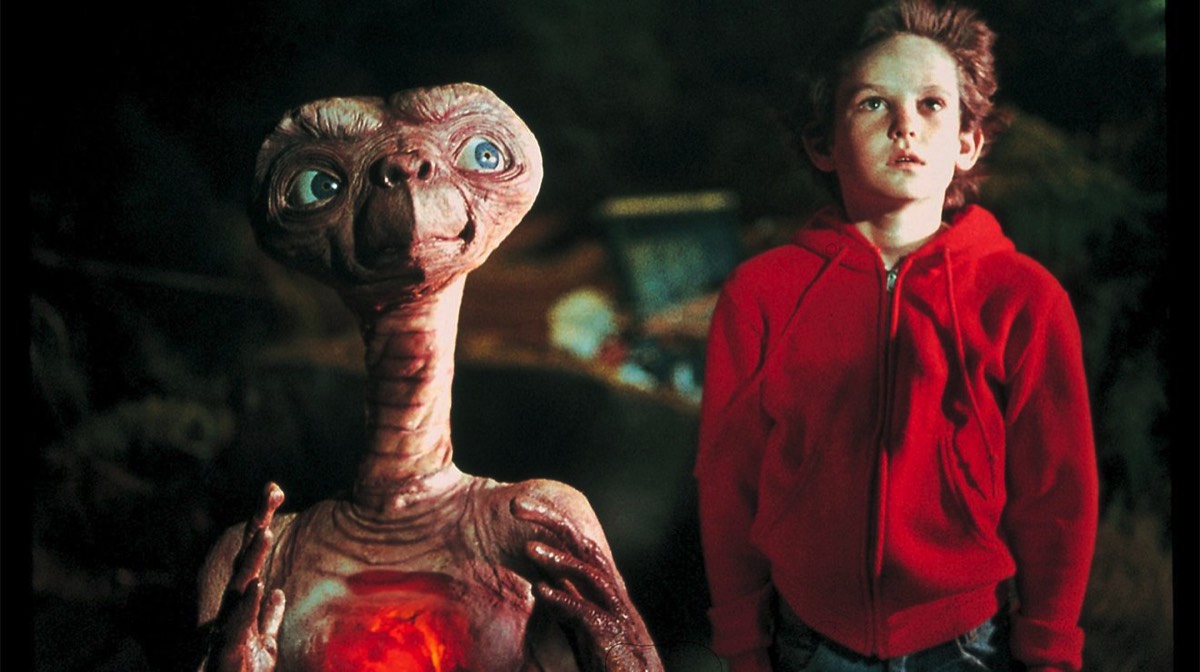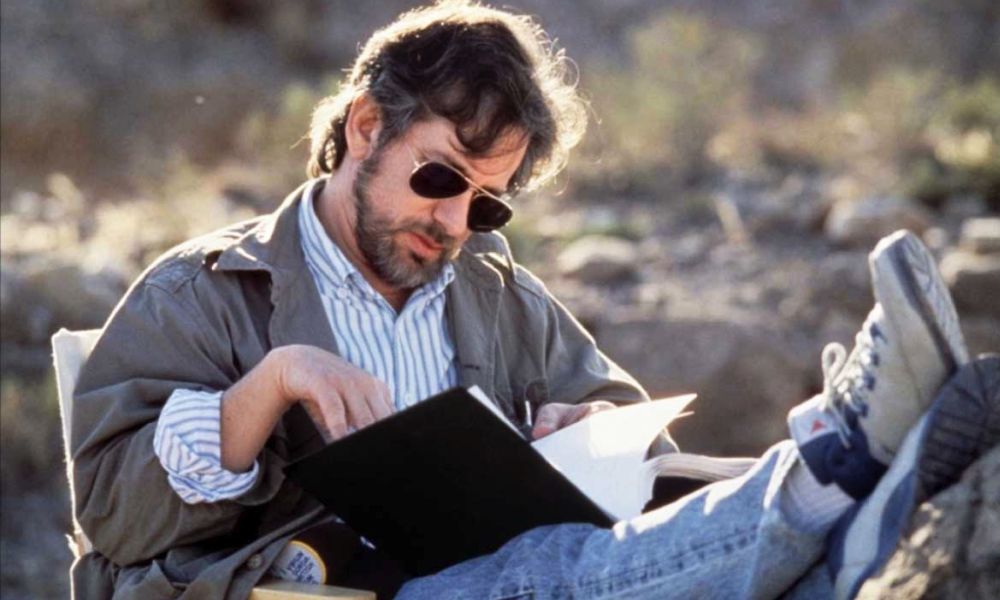"One of the most famous Hollywood directors, Steven Spielberg has an intuitive sense of the hopes and fears of his audience. This quality and his showmanship have made him one of the greats, in the league of Cecil B. DeMille, Frank Capra, and Alfred Hitchcock." - Ronald Bergan (Eyewitness Companions: Film, 2006)
Steven Spielberg
Director / Producer / Screenwriter
(1947- ) Born December 18, Cincinnati, Ohio, USA
Top 250 Directors / 21st Century's Top 100 Directors
(1947- ) Born December 18, Cincinnati, Ohio, USA
Top 250 Directors / 21st Century's Top 100 Directors
Key Production Countries: USA, India
Key Genres: Drama, Science Fiction, Adventure, Sci-Fi Action, Thriller, War Drama, Action, Chase Movie, Costume Adventure, Period Film, Children's Fantasy, Psychological Sc-Fi
Key Collaborators: Michael Kahn (Editor), John Williams (Composer), Janusz Kaminski (Cinematographer), Kathleen Kennedy (Producer), Rick Carter (Production Designer), Frank Marshall (Producer), Tom Hanks (Leading Actor), Kristie Macosko Krieger (Producer), Gerald R. Molen (Producer), Harrison Ford (Leading Actor), David Koepp (Screenwriter), Tony Kushner (Screenwriter)
Key Genres: Drama, Science Fiction, Adventure, Sci-Fi Action, Thriller, War Drama, Action, Chase Movie, Costume Adventure, Period Film, Children's Fantasy, Psychological Sc-Fi
Key Collaborators: Michael Kahn (Editor), John Williams (Composer), Janusz Kaminski (Cinematographer), Kathleen Kennedy (Producer), Rick Carter (Production Designer), Frank Marshall (Producer), Tom Hanks (Leading Actor), Kristie Macosko Krieger (Producer), Gerald R. Molen (Producer), Harrison Ford (Leading Actor), David Koepp (Screenwriter), Tony Kushner (Screenwriter)
"Steven Spielberg’s films tend to convey a certain “heaviness” with regard to adult life but joy and belief with regard to the children. He is at his most effective in his films that focus on childhood, such as E.T. (1982) and Empire of the Sun (1987), and in films where the adults act like enthusiastic adolescents, such as Raiders of the Lost Ark (1981) and Jurassic Park (1994). His portrayals of adult life, on the other hand, are marked by destructive human behavior, such as Schindler’s List (1993) and Amistad (1997), in which Spielberg constructed stories about such human tragedies as the Holocaust and a slave revolt in such a way as to create a hero." - Ken Dancyger (The Director's Idea: The Path to Great Directing, 2006)
"As America in the 1990s moves slowly away from the Reagan era, will Spielberg find new materials and adult themes, or will he seek continuing refuge in tried and true formulas? And will those formulas continue to work? And finally, will Spielberg manage to successfully mediate his apparent dual interests - being a modern day mogul in the style of Walt Disney or Cecil B. DeMille as well as being a respected artist whose work requires no apology?" - Charles Derry (International Dictionary of Films and Filmmakers, 1991)

E.T. The Extra-Terrestrial (1982)
"Even when depicting the Holocaust, slavery in America or the infernal battlefields of World War II in his serious, honourable period projects, Spielberg cannot resist sweetening his bitter history lessons with mawkishness and ameliorating sentiment. He is a director of action-adventure nonpareil, but can never fully adapt his boyish temperament to weightier material. No matter his setting or subject, we're always in Spielbergland, a world of magical make-believe where Tom Hanks can face down a German tank with a single pistol and where the "showers" at Auschwitz are really showers after all." - Jessica Winter (The Rough Guide to Film, 2007)
"Over the course of a nearly five-decade-long career, he has perfected and/or inaugurated any number of cinematic movements and innovations. Coming of age as one of the “movie brats” – the generation of filmmakers who transformed American cinema in the Sixties and Seventies – Spielberg also helped kick off Hollywood’s blockbuster culture with Jaws in 1975 (and then sent that culture into overdrive with the one-two punch of Raiders of the Lost Ark and E.T. the Extra Terrestrial in 1981 and 1982). The success of such movies and their imitators has been identified by many as one of the reasons why American film culture took a nosedive in the 1980s, but his career has always alternated between blockbusters and more serious fare. He has tackled tough subjects – the Holocaust in Schindler’s List, WWII in Saving Private Ryan, terrorism in Munich, the Civil War and slavery in Lincoln – while somehow always managing to make films that also work as popular entertainments along the way." - Bilge Ebiri (Rolling Stone, 2018)
"In bringing a distinctly personal sensibility to the traditional genres of mass entertainment, Steven Spielberg rapidly became the most commercially successful director in cinema history. While it is impossible to deny either his Midas touch or his extraordinary technical proficiency, it has nonetheless become increasingly clear in recent years that he is perhaps more at home with sentimental 'family' fodder than with more sophisticated material." - Geoff Andrew (The Film Handbook, 1989)
"With his innate ability as a visual storyteller and boundless curiosity, Steven Spielberg has created a remarkable gallery of movie moments. And he’s still finding ways to challenge himself." - Richard Schickel (DGA, 2006)
"Steven Spielberg, along with sometime collaborator George Lucas, is widely credited with rescuing American cinema from the commercial doldrums of the 1960s. However, he is just as frequently accused of reducing of the art form of the Hollywood movie to a merchandise-friendly beacon for dominant values. Spielberg's cinema strongly reflects both of these simplifications, but also contains largely unheralded thematic discourses (especially concerning the fragility of family bonds) as well as an unparalleled capacity to integrate technological innovation with the narrative forms of mainstream cinema." - Martin Flanagan (Contemporary North American Film Directors, 2002)
"Steven Spielberg movies run the gamut from lively blockbusters like the Indiana Jones series to more contemplative, grownup fare like Munich and Lincoln. His filmography is formidable: Over five decades, Spielberg has become the world’s most commercially successful director while also winning two best director Oscars." - Richard Lawson (Vanity Fair, 2025)
"It is to Spielberg's credit that he has rarely allowed his power or influence to cloud his judgement, and despite one or two fiascos (no doubt necessary, in psychological terms, to prevent vainglory), he has weaved his way skilfully between the twin pillars of popular culture and genuinely heartfelt projects with commendable restraint." - Mario Reading (The Movie Companion, 2006)
"Because of his enduring mainstream popularity (not to mention the amount of blockbuster filmmakers whose careers he’s inspired), Steven Spielberg doesn’t always receive his due, dismissed in some quarters as merely a “commercial” moviemaker who lacks the soul of a true artist. That’s nonsense. While he’s had his share of duds, the man has continued to challenge himself, tackling different genres and subject matters along the way." - Will Leitch & Tim Grierson (Vulture, 2015)
"Spielberg has a passionate interest in World War II that is reflected in the subject matter of films such as Saving Private Ryan (1998)... Most controversial of his films is Schindler's List (1993), the story of a man who saved Jews from the extermination camps; Spielberg was accused of maudlin misrepresentation as much for bravely bringing the Holocaust to light in the context of mainstream entertainment." - Murray Pomerance (501 Movie Directors, 2007)
"One of the things Henry Hathaway told me is that you just have to know what you're doing every single minute of the day. His advice was: even if you don't know what the hell you're doing, pretend you do." - Steven Spielberg (Directing the Film, 1976)
"A lot of the films I've made probably could have worked just as well 50 years ago, and that's just because I have a lot of old-fashion values." - Steven Spielberg
Selected Filmography
{{row.titlelong}}
GF Greatest Films ranking (★ Top 1000 ● Top 2500)
21C 21st Century ranking (☆ Top 1000)
T TSPDT N 1,000 Noir Films
R Jonathan Rosenbaum S Martin Scorsese
21C 21st Century ranking (☆ Top 1000)
T TSPDT N 1,000 Noir Films
R Jonathan Rosenbaum S Martin Scorsese
Steven Spielberg / Favourite Films
Citizen Kane (1941) Orson Welles, Day for Night (1973) François Truffaut, Fantasia (1940) Various Directors, The Godfather (1972) Francis Ford Coppola, A Guy Named Joe (1943) Victor Fleming, It's a Wonderful Life (1946) Frank Capra, Lawrence of Arabia (1962) David Lean, Psycho (1960) Alfred Hitchcock, 2001: A Space Odyssey (1968) Stanley Kubrick, The War of the Worlds (1953) Byron Haskin.
Source: Empire (1989)
Citizen Kane (1941) Orson Welles, Day for Night (1973) François Truffaut, Fantasia (1940) Various Directors, The Godfather (1972) Francis Ford Coppola, A Guy Named Joe (1943) Victor Fleming, It's a Wonderful Life (1946) Frank Capra, Lawrence of Arabia (1962) David Lean, Psycho (1960) Alfred Hitchcock, 2001: A Space Odyssey (1968) Stanley Kubrick, The War of the Worlds (1953) Byron Haskin.
Source: Empire (1989)
Steven Spielberg / Fan Club
Roger Ebert, Mamoru Oshii, Edgar Wright, Jonathan Rosenbaum, Armond White, Carlos Helí de Almeida, Frank Darabont, Joseph McBride, Alejandro Amenábar, Nikolay Lebedev, Harvey Burgess, Brian Tallerico.
Roger Ebert, Mamoru Oshii, Edgar Wright, Jonathan Rosenbaum, Armond White, Carlos Helí de Almeida, Frank Darabont, Joseph McBride, Alejandro Amenábar, Nikolay Lebedev, Harvey Burgess, Brian Tallerico.
"Fan Club"
These film critics/filmmakers have, on multiple occasions, selected this director’s work within film ballots/lists that they have submitted.
These film critics/filmmakers have, on multiple occasions, selected this director’s work within film ballots/lists that they have submitted.


